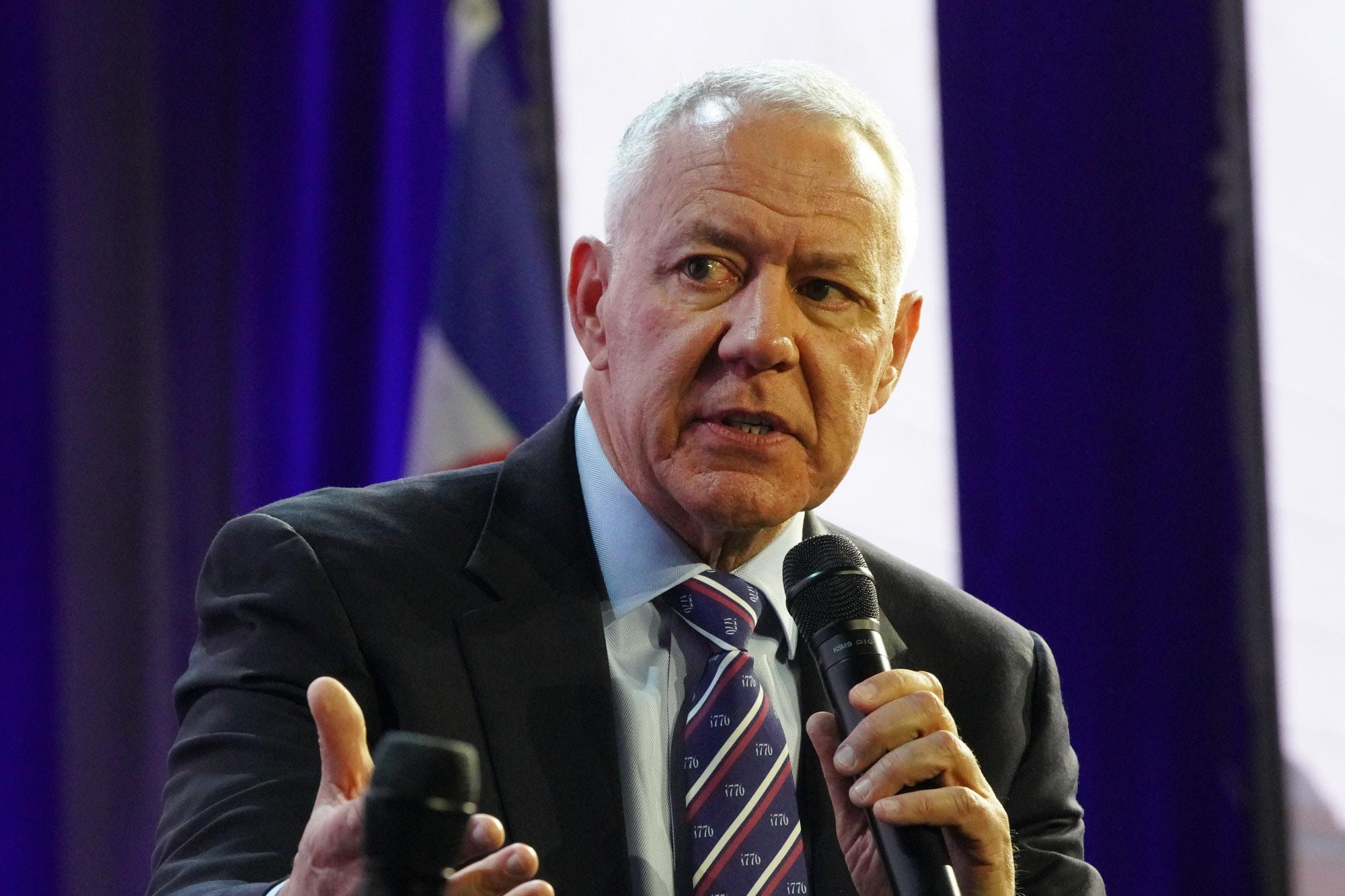
Colorado Rep. Ken Buck stood against nearly all of his Republican colleagues this week, when he voted to oust House Speaker Kevin McCarthy, the leader of his party.
It was just the latest example of the Eastern Plains congressman’s willingness to make waves in his caucus.
When McCarthy announced he was opening an impeachment inquiry against President Joe Biden, Buck published a scathing op-ed that argued his colleagues were relying on “an imagined history.”
Before that, the former prosecutor sent a four-page letter to the Colorado GOP, refuting point by point claims the party made that people arrested for attacking the U.S. Capitol on January 6 are being treated unfairly.
And over the summer, Buck stated he would not support Donald Trump’s reelection bid, if the former president is convicted of a felony.
“You make it sound like it's something new. It's really not,” Buck said of those attention-grabbing stances.
CPR sat down with Buck at his Washington, D.C. office during a week in late September when a House committee was holding one of the first impeachment inquiry hearings even as Congress looked ahead to an imminent shutdown. Buck ended up voting against the continuing resolution to keep the government open, as he has with every CR passed since he arrived in DC almost a decade ago.
When Buck speaks out against Democrats, his Republican voice is one of many. But when he takes a stand against his own side, it gets noticed — especially by the national press, which increasingly turns to him for a contrarian voice.
“My willingness to call out both sides, I think, is part of why I came here,” he said.
Buck’s background includes stints as a federal prosecutor and as District Attorney for Weld County, where he took a hardline on immigration enforcement. He supported an ICE raid on one of the county’s largest employers and tried to seize the tax documents of suspected undocumented immigrants.
Buck first ran for Congress in 2010, as the Republican challenger to Democratic Sen. Michael Bennet. Democrats attacked him as “too conservative for Colorado” and he lost by a slim margin. But that label helped four years later, when he decided to run for the deep red fourth congressional district during the Tea Party wave.
An ultra conservative, one of Buck’s big focuses has always been reining in government spending. He didn't support any of the COVID relief packages. He’s never voted for a debt ceiling increase or a continuing resolution, even when they come from his own party. And one reason Buck voted to remove McCarthy was the former Speaker had promised conservatives he’d fight for a much lower spending package than the one agreed to in a deal to lift the debt ceiling.
As for a political philosophy, Buck considers himself a constitutional conservative. “It means that the Constitution is the rule book that we should be following from both sides,” he explained. “It gives us the answer to most questions, and it certainly should influence the answer to other questions.”

That belief is why, unlike Colorado’s other two Republicans, he voted to certify the 2020 election results.
“(The constitution) says Congress shall count the votes. It doesn't say, Congress shall decide who, which presidential candidate, they like better. Congress shall count the votes,” he said.
Positions like that — and his current argument that the evidence just isn’t there to open an impeachment inquiry on Biden — are especially surprising given that Buck is also a member of the House Freedom Caucus, a group of hard right lawmakers.
“I had 15, 20 different members come up to me on the floor — not necessarily Freedom Caucus members, but members — come up to me on the floor who told me they appreciated what I was saying (about the inquiry) and that they agreed with me on what I was saying,” said Buck. “Now, if it came to a vote, would they have voted with me? I don't know. There's a political cost that not everybody wants to pay.”
So far, that cost for Buck has mostly been confined to Washington D.C. name calling. Critics have labeled him a RINO — Republican in Name Only — and accusing him of not really being a conservative. An anonymous source told a journalist he wants to leave Congress to work for CNN, the sort of insinuation that can hurt a Republican politician with their conservative base.
What voters are saying back home
What’s less clear is whether Buck’s contrarian image in Washington is changing how voters view him back in Colorado.
The fourth congressional district, which Buck represents, is the state’s most conservative, with Republicans holding a 27 point advantage based on recent elections. While the district covers most of the Eastern Plains, the majority of its voters come from Front Range suburbs like Highlands Ranch and Parker.
At a car wash close to the outlet shopping mall and chain restaurants in the business center of Castle Rock, people were taking advantage of a recent sunny day to clean their cars — and talk about their congressman.
“He's okay. I don't have any big issues with him,” said 79-year-old Bev Hahn. The retired nurse hasn’t followed the news about Buck closely, but “I’m a conservative, so I just don’t like to see a lot of extreme liberal changes.”
When it comes to the positions Buck’s taking, though, some here had views on the opposite side.
Buck has supported the prosecution of January 6th rioters. But in the eyes of Republican Thom Madrid, “There's no insurrection. There was no inciting.” And as for the 2020 vote, which Buck certified, Madrid, a contractor, believes “the election was stolen. But that's just me.”
However as someone who always votes party line, Madrid added, none of Buck’s positions would keep him from supporting the Republican, at least in the general election.
And there were GOP voters who agreed with some of Buck’s less popular stances.
Joann Baker also opposes the impeachment inquiry into President Biden, if only out of practical concerns. “I think it's a waste of time. I think we have bigger problems. I mean, everything's a mess anyway. If you impeach him, then who do we get? (Vice president) Kamala Harris? That's even scarier.”
Republican Brian Hill shares Buck’s focus on government spending.
“Something's got to change. They can't just keep overspending. We can't keep raising the limit. They've got to stop somewhere,” said Hill.
But while all of these voters said they would gladly vote for Buck over any Democrat, the real risk for him in this deeply conservative district is a primary challenge from the right.
Republican state lawmaker Richard Holtorf has launched an exploratory committee to potentially run against Buck. He criticized the Congressman for not being pro-Trump and for failing to support a Biden impeachment inquiry, and in a recent column in The Hill, accused Buck of “placating and pandering” to Democratic leaders.
“Republicans in almost every county in my district are livid about the recent reports about Buck that are coming out of New York and Washington media outlets, at a time when Colorado desperately needs Republican leadership,” wrote Holtoff. “A 4th District constituent should expect to see a man with his conservative armor on ready to fight the liberal, progressive left that is driving our country over a dangerous cliff to destruction.”

He told CPR he's heard from at least one local official who says Buck isn't doing enough to pay attention to the specific needs of the district.
"There's 23 counties in the district, I believe. But you need to be in all of them, all of them all the time," said Holtorf. "So everybody feels like their U.S. congressman is giving them the attention that they deserve because it isn't about Ken Buck, it's about the district."
This wouldn’t be the first time Buck has faced a primary challenger. Last election, anger over his decision to vote to certify the 2020 presidential election led a GOP business owner from Elbert County to mount a spontaneous challenge at the district assembly. Bob Lewis won enough support from delegates to secure the top slot on the primary ballot, but went on to lose the race by more than 20 points.
Buck has already filed to run for reelection in 2024, and if it means he’ll face some slings and arrows from his fellow Republicans, he said he understands it’s part of the game in Washington. “There are folks here who are talking about helping someone run a primary against me and things like that, and that's politics.”
Still, recent congressional history also offers a cautionary tale for Buck.
His former colleague, Republican Rep. Liz Cheney of Wyoming, stood up for her belief that former president Donald Trump committed impeachable offenses after the 2020 election, and was shunned by House Republicans for it. She first lost her Congressional leadership post and then eventually her congressional seat, in a primary.
When asked if he’s concerned he could face a similar fate, Buck pointed out he’s not in the same position as Cheney. He said he never aspired to be in leadership, for one thing, where one is expected to toe the party line. But he acknowledges the party – both parties – have changed since he first ran for office.
“I don't think that the party of Reagan and Lincoln is the party that we see today. We are much more populist on both sides, frankly,” said Buck.
And while he knows he’s made some constituents unhappy with his stands and his votes, he says there are also plenty of people back home who like what he’s doing.
“When I go to the supermarket, I have people come up to me all the time and say, ‘Thank you. Thank you for being that voice of reason for bringing some common sense to DC.’ I don't always get the milk out of the store in time, but I appreciate getting that feedback from people,” he said.
Still, if anyone is expecting him to become more of a team player to help the Republican House conference navigate this moment of disarray, they’re going to be disappointed.
“I don't play for Team Republican. I play for Team America.”
That bold statement still leaves a big question ahead of next year’s 4th congressional district GOP primary: do enough of his constituents still want to be Team Buck?
Editor's Note: An earlier version of this story incorrectly described how Buck voted on COVID relief bills. He opposed all of them but there was no recorded vote for final passage of the CARES Act.









